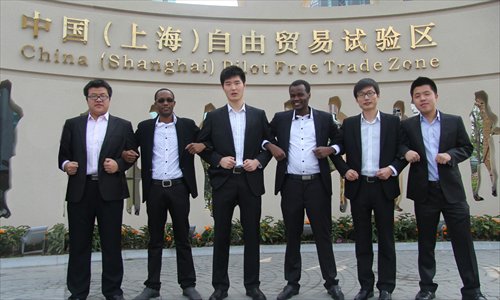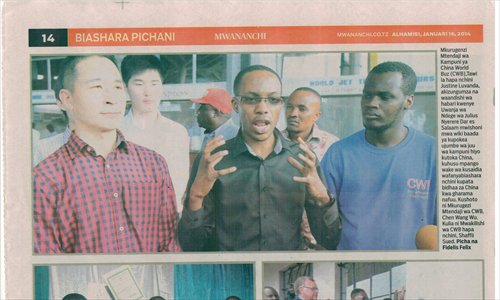How young Chinese businessmen are finding new countries to do deals with

The Chinaworldbuz company team (from left), Yao Chuan'ao, Justine Emanuel Luvanda, Ji Xiaochen, Shafii Hamisi Swed, Wang Fengzhai and Chen Tonghou in front of the China (Shanghai) Pilot Free Trade Zone in Waigaoqiao where their company is registered Photo: Courtesy of Wang Fengzhai
Making headlines in Tanzania's newspapers, on radio and television and meeting top government officials were just some of the adventures of 24-year-old Wang Fengzhai and his team when they visited Tanzania in East Africa in January to promote their unique e-commerce website.
Just one month before that, Wang had registered his B2B company Chinaworldbuz in Shanghai's newly launched free trade zone aiming to tap the rising demand for Chinese products in Tanzania. At present, the main products available on the site are Chinese brand electronic products, like mobile phones and tablet computers, as well as custom-made clothing and textiles.
Two years ago, when Wang was a junior studying marketing at the Shanghai Finance University, he met two overseas students from Tanzania, Justine Emanuel Luvanda and Shafii Hamisi Swed. Both were majoring in international economics and trade and they talked about the possibilities of a company that could facilitate trade between China and Africa.
Changed his mind
Before meeting Luvanda and Swed, Wang had a stereotypical impression of Africa and considered it largely a place of deserts, wild animals and tribal people - not a place of modern cities and business opportunities. The two students from Dar es Salaam, Tanzania's commercial capital, completely changed his mind.
"They showed me these pictures of cities in Tanzania that made me realize the country was developing quickly and was ready to embrace new opportunities. They told me the demand for Chinese products was high," he said.
According to the Tanzanian newspaper, The Guardian on Sunday, by 2012 only 17 percent of Tanzanians had access to the Internet but the number has been growing - there were 1.7 million Internet users in 2005, 3.6 million users in 2008 and 7.5 million users in 2012. Mobile phone use has also been booming.
With the growth came a rising demand for electronic products, especially Chinese made goods, which are now more affordable for Tanzanians.
Luvanda admits that even in Africa the "Made in China" label used to be synonymous with poor quality, but people's attitudes have changed with more Chinese brands building good reputations and brand recognition. "Brands like ZTE, Huawei and OPPO are respected, and in Tanzania there are communication companies working with these brands. Africans are beginning to trust the Chinese," he said.
For Luvanda and Swed, the idea for a trading company between the countries started way back before they came to China. "We came to China because we knew China had a strong economy, and there were lots of business opportunities that could link China and Africa," Luvanda said.
Largest partner
Trade between Tanzania and China reached $3.7 billion in 2013, a 40 percent increase over the previous year. China is also Tanzania's largest trading partner.
The two countries, however, lacked platforms that understood the markets. "Many of the Tanzanian business people who come to China face a lot of problems. There is the language barrier. Without a knowledge of the Chinese market, people can cheat them and they can also have problems applying for visas," Luvanda said.
So the idea developed: Wang and his Chinese team would set up the website and find Chinese wholesalers interested in the African market, while Luvanda and Swed would use their knowledge of the Tanzanian market and connections in Tanzania to market the website to Tanzanian businessmen.
To build trust with Luvanda and Swed, Wang invited them to his home in Taian, Shandong Province and they stayed there for a month, learning about each other and helping teach primary school pupils there.
In the fall of 2012, Wang registered his first company in Hong Kong through an agent. The initial funding was about 20,000 yuan ($3,220). After the website was launched, they promoted it through a Tanzanian radio station and quickly collected their first order - manufacturing chair covers for a Tanzanian businessman.
But, like many pioneering business ventures, their first attempt failed. "We were inexperienced, there were miscommunications and the businessman was dissatisfied with the product. Lots of issues emerged during payment and shipping," Wang said. In the end the Tanzanian businessman paid just 70 percent of what had been promised, and the team made no money.
After this setback, three of the six original staff of the company left, the company itself folded and Wang moved on to his last year at university.

Luvanda (first line, second from left) and Swed (front right) as featured in the Mwananchi, a Swahili newspaper in Dar es Salaam, Tanzania Photo: Courtesy of Wang Fengzhai
Keeping the dream
Like most of his fellow students, Wang then joined queues looking for work, went for interviews and interned in two e-commerce companies. But the dream of starting his own company persisted, and none of the companies he interned with was attractive enough for him to want to stay. "I'm a free-spirited person, and I didn't want to be trapped and having to live a humdrum life," he said.
He decided to start again. One of Wang's classmates joined, as well as Chen Tonghou, a man he worked with when he was an intern.
"Wang told me what he wanted to do. He convinced me to give up my job and join his company," Chen said.
Chen Tonghou, a native of Wenzhou in Zhejiang Province, managed to set up a meeting between the team and some wealthy Wenzhou businessmen. After hearing the ideas and plans of the young men, the businessmen invested some 500,000 yuan in their start-up.
Wang registered the company at the Shanghai free trade zone and rented an office in the zone in Waigaoqiao.
To better understand the Tanzanian market, this time Wang felt it was important to visit the country they had been talking so much about and to meet Tanzanian businessmen in person to promote their company.
So in January, the six of them spent more than two months touring Tanzania, visiting the cities of Dar es Salaam, Iringa, Mbeya and Arusha. Swed, who had gone to Tanzania some weeks beforehand, helped set up media interviews using his personal connections and resources in Tanzania.
The trip was a big success. More than 18 Tanzania media outlets, including the major Swahili television station, covered the story of the company, and were inundated with calls from interested businessmen.
Through a series of meetings, they began to build trust with the Tanzanian business sector. "We came to realize that Tanzanian people tend to believe what they can see. They also prefer to pay in cash rather than with online methods, which they are unfamiliar with," Wang said.
Narrowed range
The meetings also helped the Chinese narrow the range of their products to electronics and textiles. Previously, Wang had considered selling road excavators and other heavy machinery.
It was demanding in other ways as well. The team from China had to endure eating the tough local meat and found themselves sweltering in the scorching heat - although this was the Tanzanian winter. They also had problems with the Tanzanian traffic police who constantly stopped them to demand fines or bribes (Tanzanian police are reportedly one of the most corrupt forces in East Africa).
While the Tanzania trip has given the company a good start, Wang said it is still far from being a complete success at this stage. The company is at present getting two to three wholesale orders a month.
There are many difficulties in trading with Tanzania. "The Tanzanian wholesalers are usually small-sized companies or individual traders who place small orders. Many Chinese factories are unwilling to produce orders this small and taxes and shipping fees can be expensive when only a small number of products are being shipped," Wang said.
Different understanding
Communication problems still occur from time to time. These stem from not just language difficulties but also from different understandings of products. "Tanzanian businessmen are often not very aware of the specifications of a product, and we sometimes need to set the specifications for them using our knowledge of the African market," he said.
Wang remains confident about the future though and after the company becomes more established he hopes other African students in Shanghai will join to help his start-up expand to other African countries, in the same way Swed and Luvanda helped the company establish itself in Tanzania.
"With their connections in their home countries in Africa and opportunities to travel to Africa, African overseas students in China are the best people to help us set up regional offices in the rest of the continent, and we can offer them our support and resources in China," Wang said.
Newspaper headline: Into Africa!